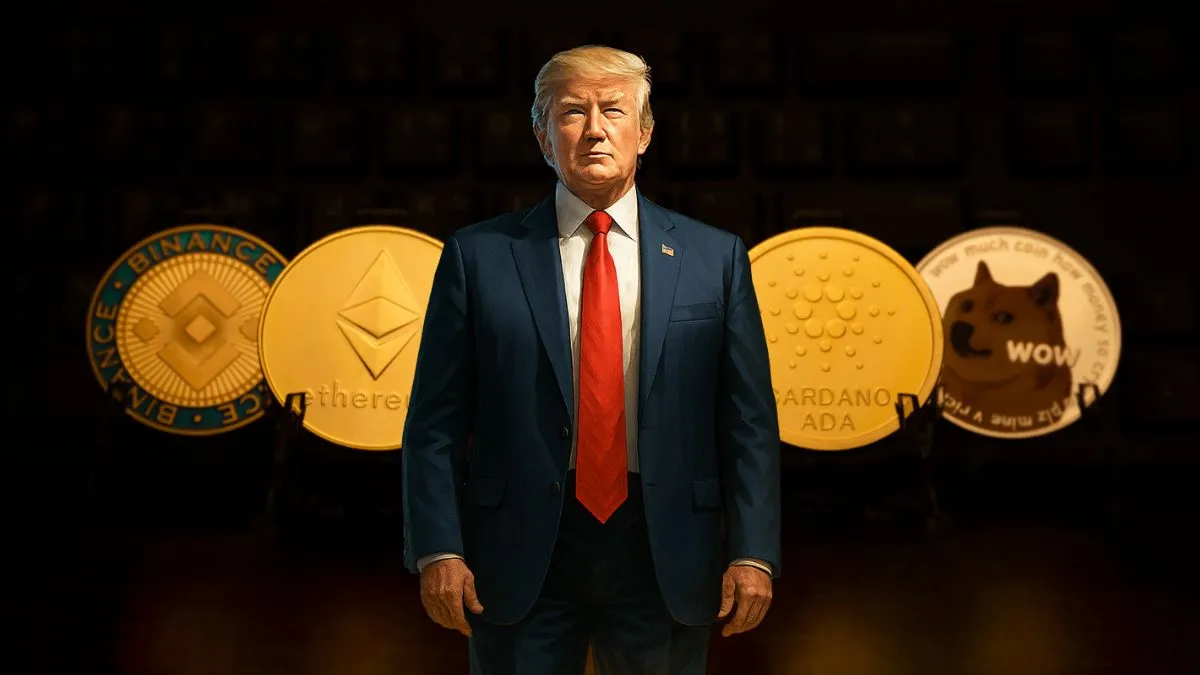Trump, Crypto, and Power: Navigating Wealth and Survival in Politics

The Rise of Donald Trump: A Journey Through Politics and Cryptocurrency
A Cinematic Political Saga
Donald J. Trump’s journey from real estate mogul to reality television icon and then to the presidency is a narrative that feels almost scripted. His unconventional approach disrupted the political landscape in Washington, leaving both supporters and adversaries in a state of confusion. Beneath the surface of campaign slogans, legal challenges, and media frenzy lies a more intricate story of political resilience, financial transformation, and a burgeoning interest in cryptocurrency.
This article delves into Trump’s presidency, his ventures into the crypto space, the criticisms he faces, and the broader implications of political figures profiting from such industries, especially when under legal scrutiny. It also raises the question of whether Trump’s financial maneuvers are truly distinct from those of other political figures like Nancy Pelosi or Barack Obama.
Breaking the Mold
Trump shattered conventional political norms. His 2016 election victory marked a significant shift, representing a populist uprising against the established elite. Despite facing intense criticism, he entered office as one of the wealthiest presidents in U.S. history, with Forbes estimating his net worth at $4.5 billion in March 2016. However, by the end of his term, that figure had dropped by $2 billion, making him the first modern president to leave office with a diminished fortune. In contrast, other former presidents have seen their wealth grow significantly post-office.
- Bill and Hillary Clinton: From $1.3 million to $120 million.
- Barack Obama: From $1.3 million to $70 million.
- Joe Biden: From near-zero to over $10 million.
While many former presidents have profited from speaking engagements and book deals, Trump’s financial journey was uniquely shaped by his prior business ventures, leading him to explore the crypto realm.
Legal Challenges and Financial Survival
Trump’s post-presidency period has been tumultuous, marked by 93 indictments and numerous legal battles that have proven financially burdensome. The costs associated with defending against these legal challenges are staggering, with a civil fraud judgment in New York reportedly amounting to $344 million.
This situation is not merely about finances; it’s a matter of political survival. His supporters remain loyal, but his adversaries are relentless in their pursuit to undermine him. As a result, Trump turned to cryptocurrency, viewing it as a potential lifeline to fund his campaign and legal defenses.
A Complex Relationship with Cryptocurrency
Initially, Trump was vocal in his skepticism of cryptocurrencies, labeling Bitcoin and others as unstable and lacking intrinsic value. However, as the Biden administration imposed stricter regulations on the crypto industry, it alienated a significant voter base. By March 2024, Trump found himself trailing in fundraising efforts against Biden, prompting him to reassess his stance on crypto.
Recognizing the potential for financial support from the crypto community, Trump began to advocate for the industry, promising to reverse regulatory crackdowns. By mid-2024, he had garnered substantial backing from crypto-related Super PACs, which contributed significantly to his campaign.
The Emergence of World Liberty Financial
In September 2024, Trump launched World Liberty Financial, a crypto venture that introduced a new token, $WLFI. His business entity holds a 60% stake in the company, which raised $2.7 million initially. Critics raised ethical concerns about this venture, questioning whether it represented a form of pay-to-play politics.
Despite the scrutiny, the model is legally sound and mirrors how other politicians have capitalized on their public service. The token’s success led to the launch of a dollar-pegged stablecoin, further expanding Trump’s influence in the crypto sector.
Financial Gains and Controversies
Trump’s foray into cryptocurrency has yielded substantial financial returns. His NFT collection, featuring digital trading cards, generated approximately $7 million. Through World Liberty Financial, he has attracted significant investments, including a $30 million stake from Justin Sun, founder of the TRON blockchain.
As of early 2025, Trump and his associates reportedly earned over $350 million from trading fees associated with meme coins linked to his brand. These ventures have raised questions about the ethical implications of a political figure profiting from speculative assets.
The Future of Trump’s Crypto Empire
With Eric Trump and Donald Trump Jr. managing World Liberty Financial, the company faces scrutiny due to its leadership’s questionable backgrounds. Despite this, Trump’s family has positioned themselves to capitalize on the growing crypto market.
As the political landscape evolves, Trump’s ventures in cryptocurrency could redefine his legacy. While his critics express concern over the potential risks associated with political figures engaging in crypto, the reality remains that many politicians have similarly profited from their positions.
In conclusion, as Trump navigates the complexities of politics and cryptocurrency, the coming years promise to be pivotal for both him and the broader financial landscape.
Nithin Eapen is a technologist and entrepreneur with a keen interest in finance, cryptocurrencies, and technology. For inquiries, contact him at [email protected].
Disclaimer: The views expressed in this article are those of the author and do not reflect the opinions of the website or its affiliates. Investors should conduct their own research and consult with financial advisors before making investment decisions.







